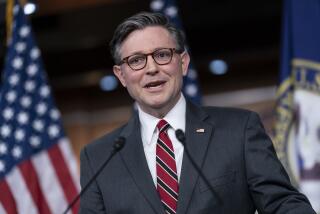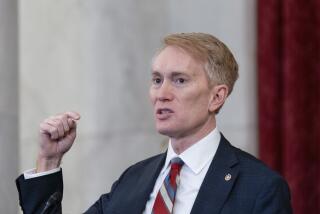Economic Stimulus Bill Risks a Bush Veto, Advisors Warn
WASHINGTON — Senior Bush administration officials set themselves on a collision course with congressional Democrats on Tuesday by saying they would recommend that the president veto a bill to bolster the U.S. economy if it includes Democratic provisions to subsidize health insurance for the jobless.
The advisors’ stance suggests how far the surge of political goodwill that followed the Sept. 11 terrorist attacks has dissipated. It raised the specter of the two sides’ never reaching agreement on an economic stimulus package.
Administration economists acknowledged that such an outcome would damage the economy. “We are playing with fire if we don’t pass a reasonable stimulus,” warned R. Glenn Hubbard, chairman of the White House Council of Economic Advisors.
Independent analysts said that increasing friction between the two parties could produce a return to the political trench warfare that existed before the attacks.
“It’s an open invitation for the Democratic leadership to take the gloves off on a whole range of policy issues,” said Thomas E. Mann, a congressional specialist at the Brookings Institution in Washington.
Strategy for a Troubled Time
The veto threat, which was made during an interview with senior administration policymakers, appeared to be part of a broader White House effort aimed at erecting a political barrier against the tidal wave of financial pleas that has swept Washington since the attacks and the new anthrax scare.
But on a day when law enforcement was on high alert against further attacks, American consumer confidence was reported to have hit a 7 1/2-year low and the stock market plunged still further, the effort seemed groping at best.
Officials frankly admitted as much, suggesting they have yet to fathom what will be needed to prosecute the nation’s war on terrorism and to revive the economy.
Although seven weeks have passed since the attacks, Treasury Secretary Paul H. O’Neill said, the White House and Congress have been fully engaged in devising an economic recovery plan only for “maybe the last two weeks.”
“Before that, there was a lot of to-ing and fro-ing,” O’Neill said. “We did a lot of to-ing and fro-ing because there’s no established dogma [about] how you think about dealing with the cost of terrorist acts.”
He was interviewed by a small group of reporters along with Hubbard, White House chief economic advisor Lawrence B. Lindsey and budget chief Mitchell E. Daniels Jr.
Asked whether the White House could accept a stimulus package that included health insurance proposals advanced by Senate Finance Committee Chairman Max Baucus (D-Mont.), O’Neill declared, “I personally would recommend to the president that he not accept” such a measure.
Hubbard and Lindsey described proposals like Baucus’ as “open-ended entitlements” that could damage the economy.
All three officials suggested that Baucus’ original proposal was to permanently subsidize jobless workers’ health benefits, but that he pared back his plan in closed-door discussions with White House officials and Republican senators.
But Baucus aides said the Democrat had never proposed a permanent subsidy. They said that under his proposal, the government would pick up half the cost of jobless workers’ health insurance through March of 2003, as well as extend unemployment compensation benefits from their usual 26 weeks to 39 weeks.
“It’s unfortunate that senior advisors to the president don’t recognize that helping 7 million unemployed Americans is good economic policy,” Baucus said in a statement.
Other senior Senate Democrats also supported the health insurance subsidy. Asked whether he thought failure to include the provision would doom a stimulus package, Senate Majority Leader Tom Daschle (D-S.D.) said, “Well, I consider it essential . . . absolutely essential.” Sen. Edward M. Kennedy (D-Mass.) called it “a critical part of any economic stimulus.”
The flare-up over health care subsidies was only the latest in a series of clashes over how to help an economy that many fear has been sent into a tailspin.
After initial promises of goodwill by President Bush and congressional leaders, the parties have headed off in sharply different directions, with Republicans demanding substantial new tax cuts and Democrats seeking some spending increases.
Congress Divided on Policy
The House and Senate are on track to produce almost diametrically opposite bills. Administration officials asserted that the differences eventually would be bridged, but they gave little hint of how.
The policymakers suggested that the nation will ultimately conclude that it can pursue its anti-terrorist fight and protect itself without substantially expanding government or altering its economic course.
They dismissed most calls for Washington to assume broad new responsibilities for such things as airport security and public health as pork-barrel politics or liberal efforts to enlarge government.
“I wouldn’t guess government would be bigger in eight years,” or at the end of a second Bush administration, Hubbard said.
But the economic problems the policymakers face were on bold display again Tuesday.
The Conference Board, a prominent business research group, announced that consumer confidence has slipped to its lowest level since 1993 as mounting job losses threaten Americans’ sense of financial security. The group said its consumer confidence index slid sharply to 85.5 this month from a revised 97 during September.
That drop sent the stock market tumbling. The Nasdaq composite index fell 32.11, or 1.9%, bringing its loss for the year to 33%.
In his comments Tuesday, O’Neill acknowledged the dim outlook and expressed uncertainty about what the new terrorist threat means for growth.
“We haven’t seen all the things that retrospectively people will look back and say, ‘These were the consequences [of the attacks],’ ” the Treasury secretary said. “Our society and our economy are still working [their] way through . . . what’s different, how it’s different and how should we respond.”
More to Read
Get the L.A. Times Politics newsletter
Deeply reported insights into legislation, politics and policy from Sacramento, Washington and beyond. In your inbox three times per week.
You may occasionally receive promotional content from the Los Angeles Times.










